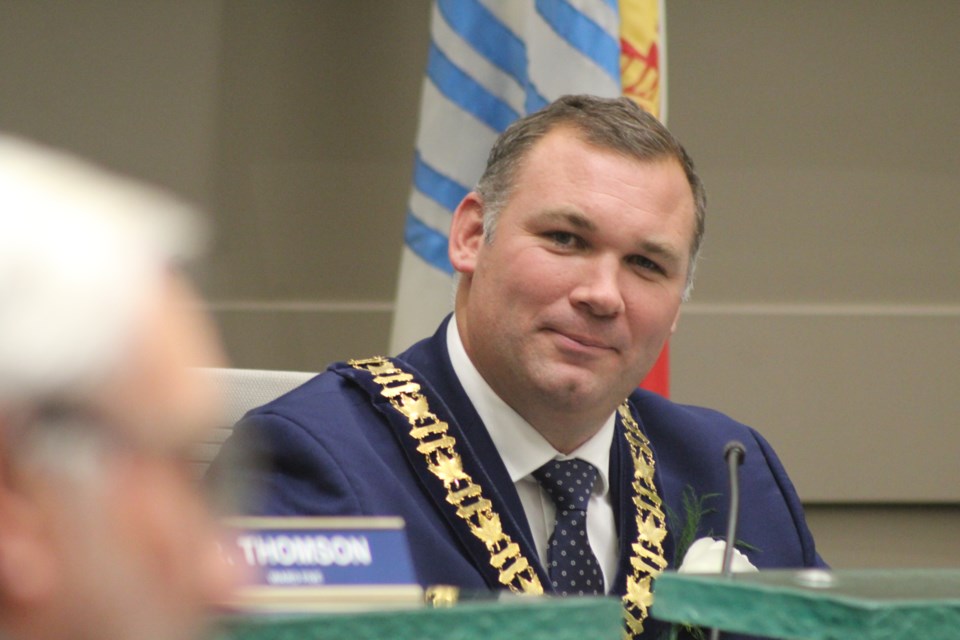A two per cent property tax increase this year for the typical Barrie homeowner is merely the starting point.
That equals another $94.51 on a city home assessed at $368,000 which had a 2023 tax bill of $4,724.
But beginning this evening, city councillors will debate and potentially change the impactful portions of the 2024 budget — policing, County of Simcoe and library services and spending.
Combined with conservation authority, physician recruitment and health unit contributions, that spending equals another 2.85 per cent tax hike.
Which means the sharp pencils will have to be out if Barrie homeowners are to be spared an unaffordable 2024 property tax increase.
“Every dollar counts. There is no question we need to figure out what’s going to make sense for this year,” said Mayor Alex Nuttall, who expects the budget to change at Wednesday night's meeting.

“I think you can’t really write anything off until we get through that (general committee) meeting," he added.
On Dec. 6, council approved the city portion of the budget, Barrie’s annual operating and capital spending. It sets levels for more than 60 municipal services, such as firefighting, snow clearing, road repairs, transit, parks and recreation and water treatment.
“We set out a vision early on,” Nuttall said. “We’re going to fix infrastructure, we’re going to build infrastructure and we’re going to keep city operations (costs) under control.”
The two per cent tax rate increase is for infrastructure investment funding or IIF, used to replace and renew Barrie’s roads, pipes, buildings and bridges. Half would go for tax-based infrastructure and the other half for stormwater infrastructure.
But it’s the so-called 'service partners' budgets — Barrie Police Service, County of Simcoe, Barrie Public Library, etc. — that will get fiscal scrutiny tonight.
Leading service partners’ spending is a $67.5-million police budget, a 6.78 per cent or almost a $4.3-million increase from last year, up from $63.24 million.
Police spending is historically the largest portion of Barrie’s annual operating budget. In 2023 it was approximately 22.1 per cent. It was 21.8 per cent in 2022, 22.2 per cent in 2021.
Of the 6.78 per cent budget increase, 5.3 per cent is for salaries and benefits alone.
Deputy Mayor Robert Thomson, who sits on the Barrie Police Services Board, points to an Oraclepoll Research phone survey of Barrie residents this past fall. Of 18 services the city provides, almost 21 per cent of respondents — the highest number — support police receiving greater funding from city taxes paid.
“In 2020, the big defund-the-police movement, the budget allocation showed a reduction and then every year after it’s been an increase for policing,” Thomson said. “We don’t talk about that anymore because it doesn’t fit certain people’s narrative.”
He said the 2024 police budget is very clear.
“You know what they spend on 911, WSIB (Workplace Safety and Insurance Board), facilities and people (Barrie residents taking the survey) still don’t think it’s enough. You can see every line on the police budget, you (council) just can’t dictate where it goes,” Thomson said. “You can’t say to the police, ‘I want you to start buying used flak jackets or used guns.’ You can’t do that to police.
“You can say to them reduce the budget by $1 million, and then it’s the police board’s decision," he added.
Barrie police's 2023 budget asked for 7.28 per cent more funding, or a $4.29-million increase. It was pegged at $63.24 million, an increase from $58.95 million in 2022.
Aside from police spending this year among the city’s service partners, there’s $30.5 million for the county, $9.7 million for the Barrie Public Library, $2.2 million for the Simcoe Muskoka District Health Unit, $420,000 for the Nottawasaga Valley Conservation Authority, $370,800 for the Lake Simcoe Region Conservation Authority and $60,000 for the Barrie Area Physician Recruitment.
This means a net tax-levy requirement of $110.9 million in 2024 for the service partners, an increase of $9.1 million compared to 2023’s total of $101.7 million.
The majority of the service partners budget is for police, at 61 per cent, and the County of Simcoe sits at 28 per cent. Of the $110.9 million service partners budget, $98.1 million, or 89 per cent, comes from these two services.
.png;w=960)
The county provides Barrie with a number of services: land ambulances and paramedics, social housing, long-term care homes, Ontario Works, children’s services, homelessness prevention, shelter system co-ordination, affordable housing, health and emergency services, the Simcoe County Museum and the Simcoe County Archives, which store city records.
Barrie pays its share of these services, $30.5 million this year, the city says, up from $26.2 million in 2023.
“When you think of the City of Barrie’s operations being at zero (increase), and that our investment of infrastructure being at two per cent, then you compare it with the county… we seem to be going in opposite directions,” Nuttall said.
“We need to somehow figure out how we’re going to get that under control, as obviously it’s (the services the county provides Barrie) mandated by the province," the mayor added.
The total service partner budget shows an increase of nine per cent compared to 2023, equivalent to a 2.85 per cent property tax increase for Barrie residents.
A $3,205,000 increase in city spending equals a one per cent impact on Barrie property taxes this year.
Property taxes are calculated based on the Municipal Property Assessment Corporation’s (MPAC) assessed value. MPAC last did a province-wide assessment in 2016, so Barrie’s property values are significantly lower than actual 2024 market values.
Municipal governments cannot pass deficit budgets, but they can accumulate debt.
Barrie’s forecast debt level at the end of 2023 is $299 million, drops to $280 million this year, then it’s $294 million in 2025, $291 million in 2026, $287 million in 2027 and $277 million in 2028.
Large debt items for 2024 include almost $5.2 million for the city’s fleet renewal and $3.9 million for the waste water treatment facility’s new advanced nutrient renewal system.
The Oraclepoll phone survey of city residents this past fall gives Barrie councillors some guidance at budget time.
To maintain existing city service levels, respondents were asked if they were willing to pay slightly higher taxes. While 43 per cent said yes, 48 per cent said no and nine per cent were unsure.
Respondents were also asked if the taxes they pay to the City of Barrie are fair in relation to services received. While 44 per cent answered yes, 46 per cent said no and 10 per cent were unsure.
Oraclepoll’s survey of 1,000 adult Barrie residents took place Oct. 18-26, 2023 and the results have a margin of error of plus or minus 3.1 per cent.



